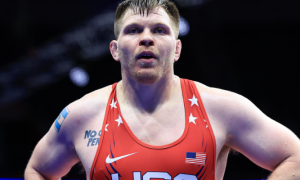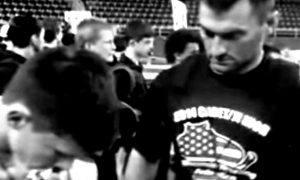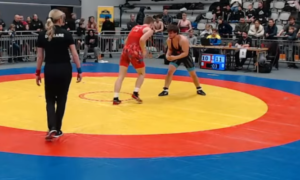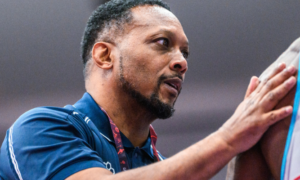You noticed the slickness before, only its familiarity is as fleeting as a passing summer storm. The smoothness in which the athlete moves and goes about his business is a lot like lamb rhythm in poetry — there is “unstressed” before the “stressed.” Andrew Berreyesa is cutting angles fluidly now, his opponent unwittingly assisting in penning the next verse. Then, with a sudden exertion, Berreyesa careens aggressively behind his foe, locking his arms tightly. He gathers the position and in one fell swoop, completes the arch, sticking the landing. Points arrive following moments like these but as of now, they are inconsequential. The task at hand has been accomplished. Berreyesa had launched the throw perfectly, resulting in a definitive early ending. A show of dominance, certainly, but it’s really but an appetizer for the main course that comes later.
Berreyesa, you see, was just getting started.
Two days in July may not make or break a wrestler’s career, but there is something to be said for finally shattering a glass ceiling. Berreyesa amassed a perfect 7-0 record at the 2017 Junior Greco-Roman Nationals in Fargo, North Dakota over the weekend and in the process of doing so, became the first such champion in the history of Nevada along with nailing down his seventh All-American status at the event, another milestone. But for Berreyesa, it was also a means of validation. Recognized as a very serious multi-style talent nationwide, the Cornell-bound athlete is a Greco-Roman devotee who had come close before at Fargo only to be turned back in disappointing fashion. So this meant something to him. Wrestlers, no matter how many accolades they pile up during their travels, always seem to have certain obstacles they feel the need to vanquish and this was one of them for the gifted kid who was forced to come of age without an allotment of willing dance partners.
Nevada is not known as a wrestling hotbed, despite its recent uptick in overall participation. This left Berreyesa with few options when it came to finding likeminded folks who could meet the demands of a wrestler with big goals in mind. Good thing he’s blessed with tons of natural ability. But he has been able to piece it all together with the help of a special few and the results speak for themselves. Along with his domestic age-group exploits, Berreyesa has gotten himself involved with intensive Greco-Roman training and showed the fruits of that labor in the spring when he grabbed fourth place at the exceedingly difficult Austrian Open. More training, more trial-by-fire. It was all just a warmup. Next was the Junior World Team Trials in April and a fifth-place finish. More training, more lessons learned.
With the dawn of a busy summer beginning to enter into the foreground, Berreyesa got back to work in preparation to unveil his masterpiece. Confident, undaunted, and in command, he moved through the 170 lbs bracket at the Junior Nationals like a general doling out marching orders. There were hardly any missteps along the way, ultimately leading to one of the most dominant performances in the entire event. The straight-shot trajectory Berreyesa is riding suggests that as great as all this was, it may very well pale in comparison with the objectives that occupy his vision for the future. World medals. NCAA championships. Olympic golds. And not necessarily in that order.
For today, he is happy to have this one behind him. Next steps await. There are new and exciting possibilities jumping up and down in front of his eyes. But before any of that requires his full attention, Berreyesa is okay to reflect on the weekend that was, why it mattered, and what the next phase in his life represents.
5PM Interview with Andrew Berreyesa
5PM: As someone who has trained and competed in the more classical version of Greco-Roman, how do/did you have to adjust your style offensively to deal with opponents who don’t engage the same way or go hips out?
Andrew Berreyesa: I kind of had to deal with that in my Fargo finals match with Trent Hidlay. It’s like you can’t be as offensive, almost. You just have to sort of hold position and try to get them called for passive. If I would have had my way, I would have just gone out there and went for a pinch headlock two times and laid the cards out. I couldn’t because he put his head down, his hips out, and backed up. I was like, Alright, I guess I just have to run you out of bounds. You have to almost just grab an underhook and see what they do, see how they respond to that. If I’m wrestling Jesse Porter and I have an underhook in, he’s going to try to arm spin or arm throw me, either one. It’s going to be like a fight, you know? But against some of these kids, if I get an underhook, they are going to drive their heads into my chest. That’s a big style difference, and you have to try to just walk them forward, I guess.
5PM: For someone like yourself who is offensively-minded, I’d imagine that is pretty frustrating. You have to remain as patient as you can possibly manage.
AB: Yes, very much, very much. You have to be a lot more patient with these guys who put their hips out. Obviously, you’re going to be a dominant hand-fighter. If you know Greco, like European-style almost, though I hate to use that term, you have to be the dominant hand-fighter and just wait for them to implode (laughs).
5PM: What about the officiating? That has been a point of emphasis lately. The criticism in the past for US officials reffing Greco centered around inconsistency and not encouraging action enough whereas overseas, they can be almost militant and call passives left and right. Since US officials ref the other two styles a lot, some say they can often get caught in between. What did you notice this time around since you also have experience wrestling with overseas officials calling your bouts? Did it play a role in how you actually wrestled?
AB: I went on the Austrian tour earlier in the year and like you said, the refs were very militant and even in Vegas at Juniors, I felt like it was different than Fargo. The passives come a lot quicker in Europe, and even at Juniors (World Team Trials) I felt it was like this to where if you gave up some position and you weren’t holding center, you were going to get hit for passives. But at Fargo, these officials were almost afraid to put up points. Zero points were scored in the second half of my match in the finals but I thought he was going to get hit for passive. Because I’m being patient, I’m not going to go out there and try to throw this guy if he’s hips back. He’s not in the fight, so I’m not going to get a throw, I’m not going to get a bodylock on him. I’m just going to hold position. These refs are just like, Attention, attention, but they’re never really going to give the passive points and then nothing ever happens.
It just sells that traditional narrative of, Oh, Greco is boring, blah, blah, blah. If they would have just put some points up there, called some passives, threw some cautions out, maybe there would have been more action. But they were almost too timid. And I go back to freestyle where they have the shot clock and they have to give some points. I’m not sure that would work in Greco, but maybe that’s the way it has to be if they aren’t going to give any caution-one’s there.
5PM: The Austrian Open is an important event on that side of the world pertaining to the Junior level and you performed well in a very tough bracket. When you combine that event with your experience over the last year as a whole, and your previous performances in Fargo, were your expectations going into this year’s event sky high?
Andrew Berreyesa: Yes, the last two years at Fargo in Greco, it was Kamal Bey. Obviously in the finals in 2015, he threw me for five and backflipped over me and all of that stuff. And then last year, I guess you could call it a closer match, I got like two points on him. But still, I was improving. And I was like, Okay, Kamal’s not eligible for Fargo this year, I’m ready to win this Greco title. Going into Austria, that experience was just so important and right before that I went to the Olympic Training Center. It was my third time and I trained Greco only every time I’ve been there. So I’ve had a lot of contact with Coach (Matt) Lindland it feels like every time my mind has just been completely blown because I’m learning so many new things. The first time I went there, it was shocking, almost. To be exposed to all of these guys. At the time, Hayden Tuma was living there and he was the best hand-fighter I ever wrestled against. It’s like every time I’m exposed to these high-level Greco coaches, I feel like I’m just mindblown learning new things. Coach (Rob) Hermann at the Austrian Open was showing me all of this cool stuff, I was like, Wow, this is going to be awesome.
So going into this Fargo, I don’t think I had any nerves at all. I knew I was going to win. In my mind, I knew I already won, I just needed to project that into the real world.
5PM: When you say that, do you mean it in like, a visualization-mental-preparation-way?
AB: Yeah, for sure, I visualize that stuff all the time. I knew I beat some good kids at UWW and I thought, None of these guys are going to even be close. In my mind, hand-fighting with these kids, I visualized it like you said, getting to my locks and stuff. I was like, I’m going to do this. There were no nerves, there was no pressure. I just went out there and wrestled Greco like I knew how, and like I learned to this year.
5PM: You hit a bunch of highlight-reel throws but you also dominated inside, which doesn’t get the same attention. People see the results of the hand-fighting and the setups, but a lot goes into just getting there. Were there any moments that caused you to readjust and reevaluate your approach, be it from a technical or tactical standpoint?
AB: Yeah, I mean, my five pointers were off of a straight lift-suplex, right? People started to catch on and I had to misdirect on that straight lift, but that was pretty much it from par terre. Also, raising my underhook higher, that was something Coach Lindland drilled into my head, a high underhook. That was something I had to improve on by probably around the second or third match. I started getting a little sloppy with some of my ties, not being patient enough, and I kind of fixed that going into the second day, that is probably when I made that adjustment.
5PM: Going into that second day, how are you holding up physically? Is there any residual soreness? Maybe there is nothing physical, but there is a little hype or anticipation heading into the next day as you’re climbing the mountain. What was your general attitude as it started getting closer?
Andrew Berreyesa: I wrestled freestyle at this tournament too and I got really sore from that. I had seven matches in that and it was just one day in between and that was a weigh-in day, so it was actually no days of rest. That’s why on the first Greco day, I was like, I need to get off the mat fast. I had four matches on that first day. In freestyle, all of those matches were drawn out. I had a few tech’s, but they were all at like, five and a half minutes in. My face was all red, raw, and beat up. So I was like, I have to get off the mat fast. And I think I was only on the mat about a minute or less each time on Day 1.
Going into Day 2, I was almost feeling the best I had all week because that was the least I had been on the mat (from the day before). I wasn’t really anxious, I guess. I almost had to forget about it because I felt so good. I was just like, All I need to do is not mess this up. I just need to keep wrestling. Hips in, hand-fight. I almost had to forget about it, otherwise I’d just get too excited or warm up too soon. So I was just, Relax, think about something else. Put on some Disney music…
5PM: Some what?
AB: Disney music!
5PM: Okay, explain that to me, I have a daughter who is five. Do you mean Disney songs, or…
AB: Yes, a Disney soundtrack (laughs).
5PM: Really?
AB: Yeah, I just listen to that, calm down, smile, and have some fun. Not right before my matches, but just so I can breathe and not get too nervous. It’s really light hearted stuff (laughs). But it gets my mind off things and I can just relax.
5PM: What is interesting to me is that what you said to yourself about getting off the mat fast. That suggests you were working with a high level of confidence because if you weren’t, you wouldn’t be worried about getting off the mat quickly, you would have been worried about making sure you somehow or another advanced.
Andrew Berreyesa: Yeah, I was really confident, especially on that first day. I had the most criteria, so I probably wasn’t going to get some big Greco expert. I just figured I’d go out there and have some fun and get the matches over quickly.
5PM: Now that it is over and you got your title in what was a very competitive weight and you’ve had a few days to digest it, does it feel like how you wanted it to feel?
AB: Yeah, it’s funny that you ask that, because you visualize something so much, like we talked about earlier, you visualize the moment and a lot of people say that when you visualize that win or getting that job, or whatever it may be, it doesn’t feel as good when it actually happens. You already know it, so you don’t celebrate as hard or it doesn’t feel as good. This, honestly, it felt better. It felt better than how I thought it was going to feel. Even though I visualized it as much as I could (laughs).
5PM: The reason why I ask is because you’re a major national competitor who several people have pointed to as a potential international/Olympic-level candidate going forward once that part of your life resumes, and I think people forget there are certain milestones for an American athlete’s career not just because they’re big wins, but also what they mean to that wrestler. This was an objective in your life that obviously had to mean something.
AB: It’s almost like a right of passage in American wrestling culture, the “stop sign.” This was my seventh time placing at Fargo, I had never won a stop sign. I placed in freestyle three times, Greco four times. I was like, I need the stop sign, almost to legitimize myself in my mind as that Olympic hopeful, that future World and Olympic champ. Everybody is always like, Fargo leads to NCAA success, World success, or Olympic success. And you read all of the Olympians — Robby Smith, double-Fargo champ, Provisor, champ, Thielke, champ. And freestyle with all of those champs, too. It’s like, Gosh, I need this to legitimize myself in my own mind. So it felt incredible to be holding up the stop sign. Incredible. Surreal.

CALL ME MAYBE? Berreyesa recounts to USA Wrestling following his win in the finals how he would call Coach Tony Spiker to get in extra training sessions leading up to the 2017 Fargo Nationals. (Photo: YouTube)
5PM: You’re going to be switching gears in the fall and are headed off to Cornell University. It’s a whole new adventure. What are you looking forward to the most and also, do you have any butterflies about going from Nevada all the way to New York?
Andrew Berreyesa: Living in Nevada, I was just our first Junior Nationals champ. We don’t have a lot of wrestling here, it’s pretty much not a wrestling state at all. I like to say that I “wrung out” every resource I could in the state because I don’t train with Olympians, I don’t even have an NCAA All-American who is training near me or anything. I literally just call up people who are as dedicated as I am and they help me out. They watch international wrestling, they watch Greco, they watch the other styles, and they help me. So it will be fun, I think, to be exposed to these other coaches like Coach Ahad (Javansalehi) on the Greco part of things, and Coach (Rob) Koll, to help me in the collegiate wrestling. I am very much looking forward to that.
As for the second part of your question, the change going from Nevada to New York, I mean, that is going to be a huge difference and I’m looking forward to that, also. I want to go right into it sprinting to gain all of the knowledge I can to become the most well-rounded wrestler I possibly can. Just living in New York…I’m not from Vegas. I split time here because I have family here, but I live in Reno, which is kind of like Ithaca, New York. It’s cold, it snows a lot, and I don’t really get homesick. I travel a lot, I’ve traveled my whole life. My brother lives in San Francisco…it’s just something I need to do to reach my goals. So it doesn’t matter where I need to go, I’ll do whatever it takes.
5PM: Mason Manville made it very clear that when it comes to Penn State, he is extremely interested in the educational aspect of the experience, not just wrestling. You’re going to Cornell, a school recognized in a big way for education. How do you see this whole sphere in front now? It’s not just wrestling, it’s a pursuit for academics and growth, as well. Expound on this if you would on how you’re viewing all this.
AB: You mentioned Mason Manville, I vibe with Mason Manville a lot, he’s a really intelligent dude. I just love his mindset on the sport, so I just want to give him a shout out. But as far as Cornell goes, I’m excited for that Ivy League education. It’s almost like a dream come true. My brother is super-pumped about it for me, too. He’s like, Oh, you’re going to be able to get any job you want, and all this stuff. My major is going to be Agricultural Science. I don’t know necessarily what I want to be. I’m really into nutrition, food science, plant science, things like that, getting the best food to the most people and promoting healthy lifestyles, especially to people in the United States. I really am passionate about that and I’m really looking forward to that at Cornell, where they have the number one agricultural school. It’s going to be rigorous, but it’s going to be fun. It’s what I like to do, I like to engage in intellectual conversation, if you want to call it that. I like learning and I like wrestling, so it’s the best of both worlds. It’s pretty much been a dream my whole life to go to a school like Cornell.
5PM: Knowing what you are walking into competitively at the collegiate level, where do you feel your advantages lie coming from your Greco background?
AB: Coaches come up to me all the time and college coaches have expressed this sentiment, as well, they say I already know how to hand-fight like a college wrestler. My Greco-to-collegiate game is so similar. It’s underhooks to two-on-one’s. I love getting in those ties, brawling with kids, and I love to hand-fight. And that is really like the biggest thing at the collegiate level, the hand-fighting. That is what I think Greco has given me. It has shaped my whole…everything. Coach Lindland and I have talked about this before, how Greco is the base of all wrestling.
5PM: Expand on that.
AB: In my opinion, you can’t really do much without getting in the ties and hand-fighting, and Greco shows you that it’s a fight. In freestyle and folkstyle, you can just back-step and shoot. Some guys back-step and double-leg or whatever (laughs). As you progress up to the higher level, you just get stuffed. In Greco, you can’t just back-step and bodylock. Maybe you can, Kamal Bey sure did that to me. But mostly, you have to fight into it. It’s a fight. Greco is like a step below boxing as far as punches. That really shows it. The collegiate level is a grind, but Greco is already the hardest grind, so in comparison to that, I don’t think it’s going to be that hard. Don’t get me wrong — it is going to be hard, collegiate wrestling is going to be challenging. But I’ve already experienced Greco.
5PM: How are you going to approach Greco competition during your collegiate years?
Andrew Berreyesa: I’d love to wrestle in the US Open. I’d love to wrestle in the Bill Farrell Greco, the Dave Schultz…I want to wrestle all the Greco that I can, anything. Senior level, Junior level, I don’t really care. I just love wrestling. I watch it 24/7. I am literally obsessed with this sport. I’ll watch a Greco match that is ten minutes long with a 2-1 score just to watch the ties. I love everything about it. I know some guys maybe don’t love to wrestle the international styles while they’re in college, but I’m not going to do that. I am going to try and do as much Greco as I can. Plus, with Ahad in Ithaca at the regional training center, it’s going to be such a perfect opportunity for me.
Follow Andrew Berreyesa on Twitter and Instagram to keep up-to-date with his career and competitive schedule.
SUBSCRIBE TO THE FIVE POINT MOVE PODCAST
iTunes | Stitcher | Spreaker | Google Play Music | RSS


















